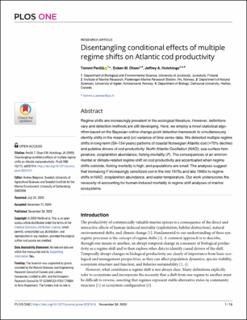| dc.contributor.author | Perälä, Tommi | |
| dc.contributor.author | Olsen, Esben Moland | |
| dc.contributor.author | Hutchings, Jeffrey | |
| dc.date.accessioned | 2021-01-28T10:37:16Z | |
| dc.date.available | 2021-01-28T10:37:16Z | |
| dc.date.created | 2021-01-16T13:22:35Z | |
| dc.date.issued | 2020 | |
| dc.identifier.citation | PLOS ONE. 2020, 15:e0237414 (11), 1-16. | en_US |
| dc.identifier.issn | 1932-6203 | |
| dc.identifier.uri | https://hdl.handle.net/11250/2725146 | |
| dc.description.abstract | Regime shifts are increasingly prevalent in the ecological literature. However, definitions vary and detection methods are still developing. Here, we employ a novel statistical algorithm based on the Bayesian online change-point detection framework to simultaneously identify shifts in the mean and (or) variance of time series data. We detected multiple regime shifts in long-term (59–154 years) patterns of coastal Norwegian Atlantic cod (>70% decline) and putative drivers of cod productivity: North Atlantic Oscillation (NAO); sea-surface temperature; zooplankton abundance; fishing mortality (F). The consequences of an environmental or climate-related regime shift on cod productivity are accentuated when regime shifts coincide, fishing mortality is high, and populations are small. The analyses suggest that increasing F increasingly sensitized cod in the mid 1970s and late 1990s to regime shifts in NAO, zooplankton abundance, and water temperature. Our work underscores the necessity of accounting for human-induced mortality in regime shift analyses of marine ecosystems. | en_US |
| dc.language.iso | eng | en_US |
| dc.title | Disentangling conditional effects of multiple regime shifts on Atlantic cod productivity | en_US |
| dc.type | Peer reviewed | en_US |
| dc.type | Journal article | en_US |
| dc.description.version | publishedVersion | en_US |
| dc.source.pagenumber | 1-16 | en_US |
| dc.source.volume | 15:e0237414 | en_US |
| dc.source.journal | PLOS ONE | en_US |
| dc.source.issue | 11 | en_US |
| dc.identifier.doi | 10.1371/journal.pone.0237414 | |
| dc.identifier.cristin | 1872512 | |
| cristin.ispublished | true | |
| cristin.fulltext | original | |
| cristin.qualitycode | 1 | |
